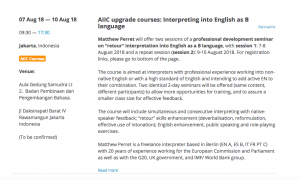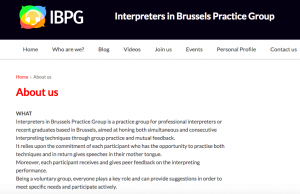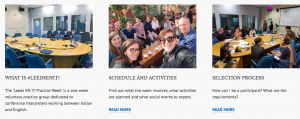‘What do you do to develop your retour?’
I sometimes ask my interpreting students this question. I’m curious to know what they do with their limited time outside of class. The calls on their time are so great (writing essays, researching the topic of the week, preparing speeches, practising interpreting into their A language, attending theory modules and other lectures, and having a life!) that I’m quite sure they want all their self-training to be productive.
In their shoes, I would want to wring every bit of juice from the exercises or activities I did to try to improve my retour. I certainly wouldn’t want to waste time on activities with a limited value.
Yet all too often, this is what they say in response to my question:
- I listen to the radio in the background.
- I watch the news on TV.
- I read the Economist/the papers.
- I’m flat-sharing with a native speaker, so I get some practice in.
- I practise interpreting from A into B (but I don’t have anyone to listen to me).
Can you see what the problem is with these suggestions?
Practising interpreting from A into B is the end goal of a retourist.
If your B language isn’t strong enough, you will produce unidiomatic English (or substitute whatever your B language is). If you don’t have a native speaker or someone with a strong English B to listen to you and make suggestions, you are unlikely to improve your performance next time (although there are ways to get around this – see my blog post for ideas).
In short, although there is definitely a place for practising your interpreting from A into B, it shouldn’t be the be-all and end-all. If you do nothing else, you will get very tired and you may limit your progress. Before you can interpret effectively into your B language, you must have sufficient mastery and flexibility in that language to produce it spontaneously and idiomatically when speaking on a variety of subjects.
Let’s turn to the other typical ‘homework’ activities mentioned by aspiring retourists: listening to the radio, reading widely, watching the news. All these activities are very passive (just think of the implications of ‘in the background’!). They may well improve your knowledge of current affairs and your comprehension of your B language, but you need to go a step further than that. To improve your retour, you need to activate your B language.
Develop your retour by activating your B language
Let’s take another look at those activities and see if we can tweak them so as to make them more active.
Listening to the radio/podcasts or watching TV
- Try repeating key vocabulary out loud.
- Take note of useful phrases (whole phrases, not just words, so you get the collocations right).
- Prepare a short glossary based on the vocabulary used in the programme or podcast you have just heard.
- After the programme, give a short summary out loud in your B language.
- Jot down a few arguments (e.g. pros and cons) and prepare a short speech in your B language based on what you’ve heard.
Reading the Economist/the papers/classical literature
The good news about reading in this way is that it can improve your background knowledge and your understanding of cultural aspects of your B language. If you choose your reading matter carefully to address your weaknesses (for instance, if you know you tend to be too colloquial in your B language), you can also work on register while acquiring useful vocabulary. It’s always good to kill several birds with one stone!
- Take note of useful phrases (whole phrases, not just words, so you get the collocations right).
- Think carefully about register. What elements of the language make it more formal? Can you incorporate any of these phrases into your interpreting?
Chatting to housemates or friends
Speaking is certainly more active than reading or listening to the radio, and is a good opportunity to expand your vocabulary and speak your B language with greater fluency. It won’t, however, improve your retour significantly if a) the person you’re speaking to doesn’t correct you when you make mistakes, b) you are not aware of nuances of register when speaking to your friends, and you pick up bad habits or phrases that are inappropriate in the workplace, and c) you only ever talk about the same things.
Make sure you are alert to colloquialisms or vulgarity in everyday conversation, to avoid, for example, telling your tutor that you are ‘pissed off’ (as a student once said to me, not realising how rude it was, as her flatmates said it all the time). Be disciplined in everyday conversations; habits such as saying ‘I mean’, ‘you know’, or ‘like’ all the time are very hard to get rid of.
Consider opportunities to speak your B language in a different context, more relevant to your future career. You could join a debating society, for instance.
‘Pre-interpreting’ exercises to help develop your retour skills
I’m calling these pre-interpreting because they are not interpreting exercises per se, but activities you can do instead of, or before, practising interpreting a speech on a given topic. As I said earlier, production takes precedence over interpretation, and these are exercises that will force you to work on reformulation and expressing yourself naturally in your B
- Preparing a speech on a subject of your choice. This is a great pre-interpreting exercise. Pick a topic, read a couple of articles, take note of a few phrases, and articulate your thoughts in a structured speech in your B language. Afterwards, you might like to try interpreting a speech from A into B on the same subject. You’ll be primed and ready to go!
- Shadowing. To clarify: I don’t think shadowing in the literal sense of repeating everything you hear is necessarily useful, especially in an A language. However, if your B language is quite weak, shadowing a good speaker is an opportunity to get a feel for intonation patterns and to hear yourself say certain phrases out loud. If your B is stronger, you can use shadowing as a reformulation exercise (listen to the ideas, edit them, and reformulate them); this is a very advanced exercise, but excellent for working on versatility, concision and paraphrasing. Look out for a future blog post about shadowing.
- Sight translation. Again, this is a challenging exercise, but a great opportunity to think about reformulation. Howe many ways can you think of to express the same idea? Sight translation is also good done in a group, because other members may come up with good ideas.
Develop your retour skills while having fun
It doesn’t all have to be hard work. There are plenty of opportunities for having fun with language and improving your retour skills almost without noticing
- Don’t forget that basic grammar and vocabulary often need work. There are plenty of useful websites and apps for this. How about Memrise for learning vocab? And why not look for quizzes to help consolidate your understanding of aspects of grammar such as prepositions?
- Play games. Articulate and Taboo are a lot of fun, and a great way to practise reformulation. A few glasses of wine will help things along! Or why not play your favourite video game, but in your B language?
- Sneak your B language into your life in other ways. Change the settings on your browser or Facebook so they’re in your B language. If the Economist seems too heavy, read a cookery/cycling/photography magazine in your B language. Find a boyfriend or girlfriend who speaks your B language (as well as the language of lurve).
Conclusion
It’s worth repeating: you can’t interpret well into your B language until you can speak your B language confidently and idiomatically in a variety of situations.
The way I see it, to develop a strong retour, you need to focus first on improving your active language skills in your B, then move on to interpreting. I’m not suggesting you shouldn’t attempt interpreting for ten years, until your mastery of your B language is perfect (as if such a thing were possible!), but my feeling is that when you start trying to develop your retour, you need to focus more on expanding your repertoire (vocabulary, register), consolidating the language and producing it spontaneously or semi-spontaneously. When you do practise interpreting, make sure you have done plenty of preparatory work to smooth the way for a productive practice session and to boost your confidence, which is absolutely critical to working succesfully into a B language.
As your B language improves and you can use your B with greater flexibility and versatility, the balance can shift and you can spend more time on interpreting.
I hope this post has given you plenty of ideas for developing your retour in ways that are productive and sometimes even fun! What works best for you? Leave me a comment – and if you have friends or colleagues who might be interested, please share this post on Facebook or Twitter!
To your success,
 Sophie Llewellyn Smith, writing as The Interpreting Coach, is a coach, interpreter trainer, conference interpreter, designer of online teaching materials, and creator of Speechpool. Follow the blog to pick up tips on how to improve your interpreting skills, and check out the website for digital material to complement your face-to-face learning and empower you to take control of your learning. If you’re interested in personal coaching, why not book a free discovery call?
Sophie Llewellyn Smith, writing as The Interpreting Coach, is a coach, interpreter trainer, conference interpreter, designer of online teaching materials, and creator of Speechpool. Follow the blog to pick up tips on how to improve your interpreting skills, and check out the website for digital material to complement your face-to-face learning and empower you to take control of your learning. If you’re interested in personal coaching, why not book a free discovery call?














